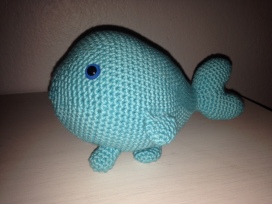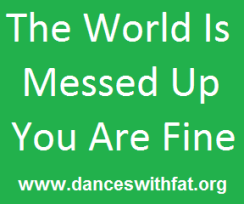
I get a lot of mail from people who asked someone to please stop making inappropriate comments/giving inappropriate “advice” etc. only to find out that the giver of unwanted advice is upset that their sincere efforts at helping fat people are not being taken well. It might be food policing, body policing, negative comments about our bodies, recommendations for weight loss methods, suggesting that [insert aspect of our life] will be better if we manipulate our bodies into a different size, or any of an endless list of unwanted interference in our lives.
All of this is often discussed under the umbrella term “concern trolling.” Often when the person doing the concern trolling is confronted with the phrase they insist that it’s rude and unfair because they just wanted to help. In many cases, this is true – maybe their concern trolling behavior actually comes from good intentions. And sometimes that creates an uncomfortable situation for fat people who suddenly feel that perhaps they need to let people treat them in ways that they find personally harmful because the person who is harming them says that they sincerely want to help.
While everyone who has to deal with it is allowed to handle concern trolling however they wish, including letting people say and do things to them that they believe to be harmful, I’d like to offer the following food for thought on this:
What they want doesn’t matter. What they think is helpful doesn’t matter. This is not about them. I think that someone who truly wants to help me cares whether or not I want their help, and cares whether or not what they might think is helpful is actually harmful to me. If I tell someone they are hurting me and they explain that they did it because they want to help, then we have a problem because whether or not they want to help, they obviously don’t have the skills and emotional intelligence to get that done.
A fat body is not a sign that we need (or have to put up with) other people’s unwanted comments and advice . Our health/food/fitness/body/life is not anybody else’s business unless we ask that person to make it their business and even then we are allowed to set boundaries.
Consider this pictorial representation (from a hilarious article about #TheInternetNamesAnimals):

In this situation I am the little girl, and the crab is the concern troll. I don’t care how much that crab wants to help, or how much that crab thinks that cuddling me is a good idea that will benefit me in some way, I am not cuddling that crab, even if the crab insists that his concern trolling is justified. You have options for how to handle this – I have some suggestions here for how to deal with concern trolling here, as well as an example from one of my own little crabs here. Regardless of what you decide to do, remember that the problem isn’t you- it’s the concern trolling, and you don’t have to cuddle that crab.
Like this blog? Here’s more cool stuff:
Like my work? Want to help me keep doing it? Become a Member! For ten bucks a month you can support size diversity activism, help keep the blog ad free, and get deals from size positive businesses as a thank you. Click here for details
Book and Dance Class Sale! I’m on a journey to complete an IRONMAN triathlon, and I’m having a sale on all my books, DVDs, and digital downloads to help pay for it. You get books and dance classes, I get spandex clothes and bike parts. Everybody wins! If you want, you can check it out here!
Book Me! I’d love to speak to your organization. You can get more information here or just e-mail me at ragen at danceswithfat dot org!








 One of the things that I find incredibly frustrating in discussions that I have about weight and health happens when I point out that there is not a single study where more than a tiny fraction of people have succeeded at maintaining long term weight loss, and people agree with me. Stay with me, I’ll explain:
One of the things that I find incredibly frustrating in discussions that I have about weight and health happens when I point out that there is not a single study where more than a tiny fraction of people have succeeded at maintaining long term weight loss, and people agree with me. Stay with me, I’ll explain: I have found massage therapy to be amazing – most of the massage work I get is sports massage but I’ve also had the occasional relaxation massage. It can be great, but it can also be a fraught situation – you’re lying on a table, vulnerable, while someone is touching you. It’s a terrible time to be fat shamed. Recently, reader Lucinda had this experience. She shared her brilliant response with me and gave me permission to share it with you:
I have found massage therapy to be amazing – most of the massage work I get is sports massage but I’ve also had the occasional relaxation massage. It can be great, but it can also be a fraught situation – you’re lying on a table, vulnerable, while someone is touching you. It’s a terrible time to be fat shamed. Recently, reader Lucinda had this experience. She shared her brilliant response with me and gave me permission to share it with you:



 We had our first call for the
We had our first call for the 



